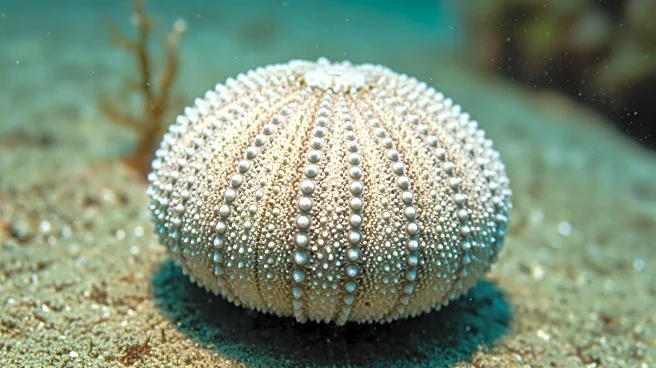What's Happening?
A team of scientists led by developmental biologist Periklis Paganos from Stazione Zoologica Anton Dohrn in Italy has discovered that sea urchins possess complex nervous systems that function as 'all-body brains.' This discovery was made while studying
the metamorphosis of purple sea urchins, which transform from planktonic larvae to mature, spine-encrusted adults. The research reveals that sea urchins have a sophisticated array of neuronal cell types throughout their bodies, challenging the notion that echinoderm nervous systems are simple due to the lack of a centralized brain. The study, published in Science Advances, highlights the genetic similarities between sea urchins and humans, suggesting a more complex evolutionary history for nervous systems.
Why It's Important?
This discovery has significant implications for understanding the evolution of complex nervous systems. It challenges the traditional view that centralized brains are necessary for sophisticated neural functions, suggesting that decentralized systems can also achieve complex organization. This could lead to new insights into the development of nervous systems in other species, including humans. Additionally, the genetic similarities between sea urchins and humans may provide valuable information for biomedical research, potentially aiding in the study of human neurological conditions.
What's Next?
Further research is likely to explore the genetic and molecular mechanisms underlying the sea urchin's nervous system. Scientists may investigate how these findings can be applied to other echinoderms and vertebrates, potentially leading to breakthroughs in understanding neural development and function. The study may also inspire new approaches in biotechnology and medicine, leveraging the unique properties of sea urchin neurons for therapeutic purposes.
Beyond the Headlines
The discovery of 'all-body brains' in sea urchins raises ethical and philosophical questions about the nature of consciousness and intelligence in non-human species. It challenges the anthropocentric view of brain function and may influence how we perceive and interact with marine life. This research could also impact conservation efforts, highlighting the ecological importance of sea urchins and their role in marine ecosystems.
















